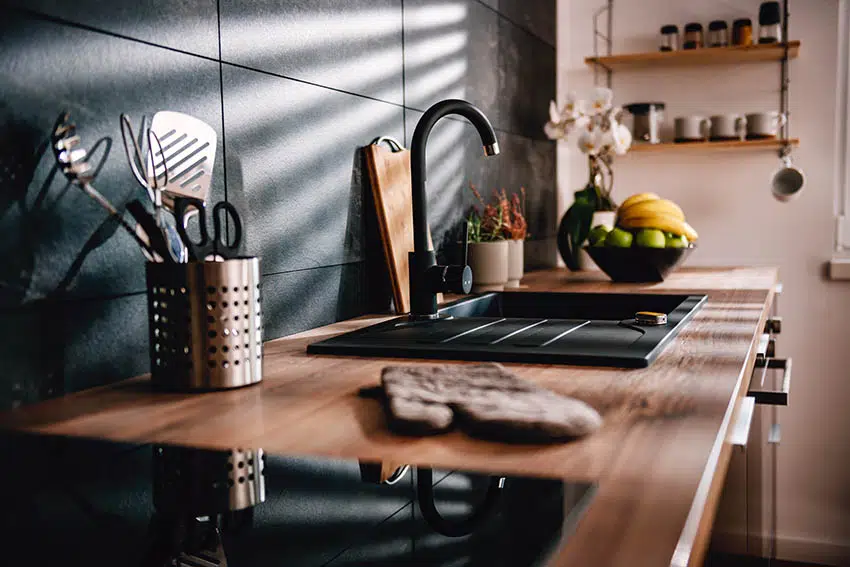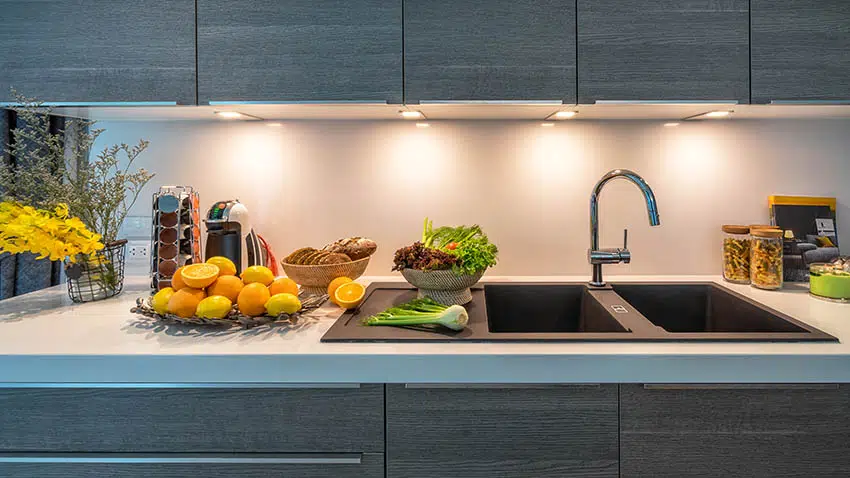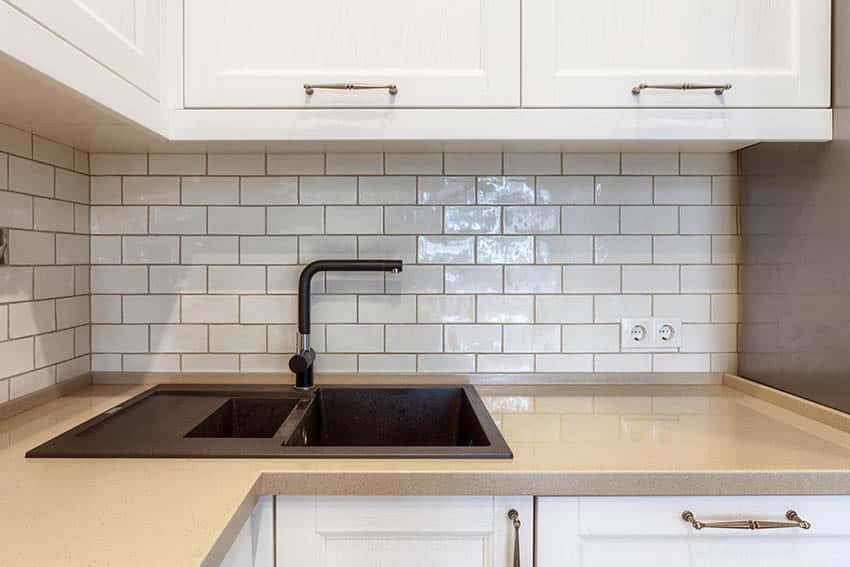Pros And Cons of a Quartz Kitchen Sink: What You Need to Know- 6 Important Tips
There’s more to just beauty when it comes to a quartz kitchen sink. The kitchen is the home’s hub. Whether you’re cooking up a storm, washing the dishes, or just sipping coffee at your table while reading the morning paper, it’s where we spend a lot of time. It’s also one of the most important rooms to maintain and update – not just for functionality but for enjoyment.
One of the most recent trends in kitchen design is quartz countertops. Quartz has become popular because it is nontoxic, durable, easy to clean, and has a natural beauty that will last a lifetime.
It can be used as an alternative to granite or marble slabs and surfaces in your kitchen. But before you go out to buy a quartz sink for your kitchen, here are some pros and cons to consider.

What Is Quartz?
Quartz is a natural, inorganic solid. Quartz is made up of a silicon and oxygen molecule that’s bonded together and can be found in granite, limestone, sandstone, and many other natural rocks. It’s also the most abundant mineral on earth!
The Pros of Quartz
Quartz has a high level of heat resistance, which makes it ideal for use in the kitchen. It can withstand temperatures of up to 800 degrees Fahrenheit without showing any signs of wear or cracking.
Unlike granite and marble, quartz does not stain or discolor when exposed to acidic substances such as coffee, fruit juices, wine, and vinegar. Quartz is also resistant to scratches and stains from chemical products like bleach.
Quartz is an eco-friendly option because it is made from silicon dioxide sand that is melted into glass at temperatures around 2000 degrees Celsius. This process creates a material that is more durable than other natural materials used in countertops like stone and wood.
The Cons of Quartz Kitchen Sinks
Quartz sinks are always in high demand because of how popular they have become. So, the downside is that it’s difficult to find a store that has the right one in stock. You might have to order it online or drive for hours to get what you need.
Quartz is also a brittle material and can break easily if dropped on a hard surface like ceramic tile or concrete. Another major drawback of quartz kitchen sinks is that they are not as widely available as granite or marble.
Some stores don’t carry them at all, and others only offer them in smaller sizes like 24 inches wide and 36 inches long.
Who Shouldn’t Have a Quartz Kitchen Sink?
The most important thing to know about quartz is that it can only be sealed once. If you seal your sink and then scratch or chip the surface, the sealant will wear away.
So, who shouldn’t get a quartz kitchen sink?
1) Those who are prone to dropping dishes
2) Those who have children in the home
3) Those with pets in the home
4) Those with young children in the home
5) Those with dishwashers who prefer not to use hand wash
6) Anyone prone to flooding their kitchen (You may want to wait until you’ve upgraded your plumbing before getting a quartz sink.)

How to care for a Quartz Kitchen Sink
One of the main benefits of quartz is that it’s relatively easy to care for. You don’t need to take any special precautions when cleaning a quartz surface. All you need is a mild, non-abrasive soap and water.
Make sure you rinse the sink with plenty of water, as well as use a soft cloth or sponge to wipe away any remaining residue.
If you’re using an abrasive cleaner, like Comet or Ajax cleanser, be careful not to scrub too hard or use too much pressure. The grit from the cleanser could scratch your quartz surface and cause irreversible damage – so avoid these types of cleaners at all costs!
A lot of people see a quartz sink as being low maintenance, but this isn’t always the case. Quartz countertops are more durable than granite and marble surfaces, but they can still be scratched or marked if not cared for properly.
While it’s important to clean your sink often, you also want to avoid harsh abrasives that can lead to scratches on your kitchen’s centerpiece.
Quartz vs. Granite and Marble
A common question people ask when they are considering a quartz sink is: “Is it worth the investment?” Quartz has the best qualities of granite and marble but at a lower price, making it an excellent alternative to those more expensive natural stones. But is it better than granite or marble?
Pros of quartz include its non-porous surface, which means no staining and no need for sealant. Quartz also has a lower weight than other materials, so you can use less material for your product and save money. Another pro is that it does not scratch, even with prolonged use.
The cons of quartz include that it’s more sensitive to damage from sharp objects than other materials, such as granite or marble. There may be some concern about bacteria if there were any cracks in the surface or if anything spilled on it – though there would be with any material.
Some people also find that polished quartz can be slippery because it doesn’t have much contrast between the stone and the countertop around it.
Summary of the Guide
Quartz is a natural and nontoxic material that has become increasingly popular in the kitchen. Quartz is durable and easy to clean, while also being more affordable than other stone types.
However, there are some negatives to quartz countertops: they’re prone to chipping and scratching when used daily, which can make them less attractive over time. If you’re looking for a material that’s more resistant to daily wear and tear, it might be better to go with granite or marble.
Which is the best sink material: Quartz or Steel?
In these days of modern materials, it can be hard to decide which sinks are the best option. Knowing that they have a significant impact on your kitchen design, you want to make sure you get it right.
Many people think that quartz is the way to go if you’re looking for a beautiful stone surface that’s easy to maintain. But quartz sinks are made with copper, so you’ll have to worry about damaging them with acidic food or cleaners.
On the other hand, steel sinks can withstand acidic foods and cleaning without reacting chemically with anything. Steel also looks sleek and modern, but it doesn’t hold its shine quite as well as other finishes. Check out this article for more information on what sink material is best for your kitchen!

What are the benefits of a quartz kitchen sink?
Quartz is a beautiful, more traditional material that’s easy to maintain.
Quartz sinks are made with copper, so you’ll have to worry about damaging them with acidic food or cleaners. On the other hand, steel sinks can withstand acidic foods and cleaning without reacting chemically with anything. Steel also looks sleek and modern, but it doesn’t hold its shine quite as well as other finishes.
What are the benefits of steel?
Steel sinks are one of the most popular materials because they are durable, affordable, and come in a variety of colors. They are resistant to corrosion, which is great in homes with children or pets.
It also means that you can use metal utensils without worry. Steel sinks tend to be heavier than other material types, but they are generally more resistant to scratches and stains.
What’s best for my kitchen?
If you’re trying to figure out which kitchen sink material is best for your home, there are many factors to consider. One way to think about it is that steel sinks look sleek and modern, but they don’t hold their shine as well as a quartz or copper sink.
Another consideration is that if you’re looking for a stone surface, quartz is the way to go—but it reacts chemically with acidic foods and cleaners.
The material of your sink has a significant impact on your kitchen design, so you’ll want to invest some time in figuring out what’s best. There are also plenty of other factors, like the size of your kitchen and the style of your home, that may affect your decision. This article can help you start thinking about what would work best in your kitchen!
Conclusion
With so many sinks on the market today, it can be difficult to decide which one is best for your kitchen. If you’re looking for a sink that resists heat, scratches, and stains, quartz is the material for you.
For a sink that’s durable and easy to clean, steel is the best option. If you have more specific needs—such as looking for a sink with a large basin or one that’s scratch resistant—choose the material that best suits your needs.
Quartz is one of the most popular choices for kitchen sinks, and for good reason. It’s durable, easy to clean, and comes in a variety of different styles.
Steel sinks are also an excellent choice because they are durable, affordable, and come in a wide variety of styles. That being said, the best material to use depends on what you prefer and what you are looking for in your kitchen.
Image Source: Designing Idea
READ MORE: Re-Inspired Kitchen